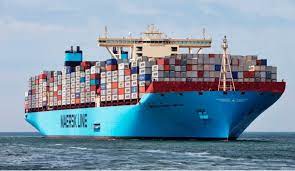
A.P. Moller - Maersk announces its prospects for next year and takes stock of 2021, a period, according to the company, still marked by the impacts of the Coronavirus pandemic. The goal, however, is to lead the search for solutions and improve the global supply chain.
Maersk's president for the East Coast of Latin America, Julian Thomas, believes in a more prepared market. "Based on the orders made today, an increase in ship capacity is expected by 22% of the world market." Ship delivery is scheduled for the period 2021 to 2025, with a higher volume in 2023.
Concerning containers, the executive highlights some actions. "We are acquiring new containers and we have been able to reduce the time it takes for the container to get out and back from the port, gaining more agility in the process. In addition, we expect the restrictions imposed by the covid-19 pandemic to be reduced with increased vaccination," Thomas says.
When it comes to demands, the president points out that volume should remain at current levels in the second half of 2021, with an expected increase of between 2 and 4% in 2022.
Scenario
Amid the pandemic, Maersk observes the market and defines stocks. That's because the company reveals that there are about 350 container ships around the world stationed outside their designated ports and with no room to dock. With 90% of international trade done by sea, this global issue is not only impacting import and export but also creating logistical bottlenecks.
To fully understand the complexities of the situation, its impacts and identify possible solutions, Maersk informs that it has sought to develop global logistics, not only in terms of infrastructure but also digitally and sustainably, taking the leading role in the issue of decarbonization and digital transformation of the logistics sector.
In this context, Maersk has gone beyond the ports, aiming at the development of end-to-end logistics, ranging from the production plant to the point of sale, integrating all processes of the chain, and mitigating logistics bottlenecks.
DevelopmentMaersk's president for the East Coast of Latin America also stresses the importance of developing integration in the sector, as the entire logistics chain is committed when there is a significant increase in the volume transported, causing bottlenecks at all stages. "If we have an increase in demand on ships, we need to develop the ports and, consequently, the rail modal, which will transport the cargo to other regions. Everything is interconnected," Thomas explains.
To meet the growing need for containers, the group has initiated a series of actions to mitigate scarcity and optimize global logistics. "We make all our ships available and release idle capacity. We also reinforce other means of transport such as barges, trains, trucks, depots, and feeders. We also reposition the ships between trade routes and ports to achieve greater efficiency," he said.
The executive adds that the increase in freight has impacted the spots contracts. "Customers with long-term contracts, in turn, have their values honored by the company. This long-term partnership brings more reliability in the service, which benefits both the shipowner and the customer."
Thomas also explains that the current supply and demand scenario has caused freight rates to increase, but this is neither a long-term situation nor a welcome scenario for shipping companies. "With historical profitability of only 2% - lower than the cost of capital - operators cannot invest in measures such as buffer capacity and more flexible network projects."
According to him, it takes a new way of looking at things, with flexibility, agility, and resilience by assigning a value in the cost of the product. "That's why, to build the resilience needed and avoid a similar situation in the future, shippers, dispatchers, and other stakeholders need to realize that there is a cost associated with making supply chains more resilient," he said.
The president concludes by saying that these higher upfront costs will result in significant long-term gains for customers as the ecosystem generally improves. "So, what we need to do is to decommoditize transportation and create a partnership mindset."